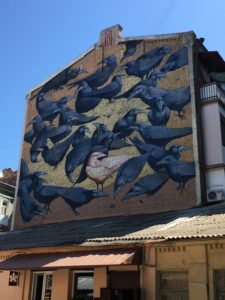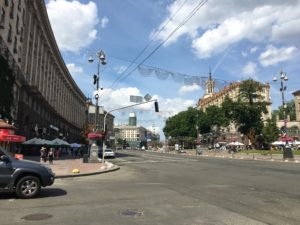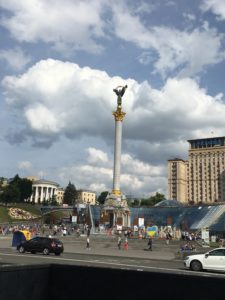I have been in Kiev for two weeks, and while it sometimes feels like I have been here forever, I still have so much to learn. My listening comprehension is slowly improving, and I have been focusing on participating more in class during our discussions. This has been difficult, because while there are only four other students in the class–three from France and one from Norway–they are all my senior by 15-20 years, if not more, and Russian is their third language.

However, my teacher is encouraging in class and prompts me to respond to my classmates when they dominate the conversation. This has been a new experience for me, because my whole life in school I have never hesitated to participate in class discussion. But this experience has taught me to be more conscious of how people think and participate at their own pace.
I have also been focusing on my pronunciation, particularly the unstressed “о” in Russian that is pronounced like an “а.” I have gotten much better at pronouncing commonly used words like потому-что (because) [pronounced: pah-tah-moo schtA, NOT pah-tah-moo schtO] and Россия (Russia) [pronouced: rAh-see-ya, NOT rOh-see-ya]. And yes, I have been pronouncing the word for “Russia” wrong the entire time I’ve been learning Russian. But I still have some trouble with other words, and my sight-reading is horrendous. I can read and write Cyrillic well, but I can’t sound out new words to save my life. It reminds me of kindergarten all over again…
On a different note, I asked my peer tutor, my host brother, and a student that my host mom tutors, what they think about the United States. The general consensus was that US is a good country, and better than Ukraine in many ways. For my peer tutor, who is in the National Guard of Ukraine, his response focused on the superiority of the US military in comparison with that of Ukraine, as well as how there are many more opportunities in the US than in Ukraine. However, while he would like to visit the US, it is very difficult to obtain a visa to travel there. He isn’t very interested in politics, and didn’t have much of an opinion about Donald Trump.
My host brother will be starting high school next year. While he said that it might be a good thing that Trump is controversial in the US because it could be a sign that things need to change, he added that he can see why people might call Trump a racist, due to his comments towards minority groups. My host brother also talked about how the US government takes care of its people and has better health care, in comparison with Ukraine. However, he was much more interested to talk about the comparison between education systems, and wanted to know more about life in the US based on the American movies he has seen.
Lastly, I spoke with a university student that my host mom tutors in English. He said that he wants to learn English because he is interested in programming, and he can make a lot more money programming in the US than in Ukraine. Like my host brother, he also mentioned that the US has better social services and that the US government takes better care of its people than the Ukrainian government. He said that Trump is “strange,” but that he has an interesting way of communicating with North Korea and Russia. The student also stressed the importance of gun rights for self-defense in the US, commenting how in Ukraine this is not allowed and that the government will take the weapons away.

I think an important context for these three interviews is the Революция Достоинства (Revolution of Dignity), also known as the Euromaidan Revolution, which occurred in Ukraine in February 2014. Led by university students and taking place in Майдан Незалежности (Independence Square) in Kiev, the revolution sought to address the corruption and stagnation of economic growth in Ukraine, as well as Ukrainian President Viktor Yanukovych’s decision to forego an agreement with the European Union and instead pursue closer ties with Russia. Long story short, over 100 people were killed and 1000+ people injured in protests, but the revolution resulted in the ousting of Yanukovych and overthrow of the Ukrainian government. The annexation of Crimea by Russia occurred shortly thereafter.

While the three Ukrainians that I interviewed are young, they are all old enough to remember the Revolution of Dignity only four years ago. I did not want to ask them about it specifically, because it is a very sensitive topic and I do not know them very well. However, after witnessing their own government release riot police on peaceful protestors and seeing the violation of international borders by Russia in Crimea, it is understandable why gun rights, military might, and the government’s treatment of its own citizens are all characteristics of the United States that stand out to these Ukrainians.
I originally asked my host mom for her opinion on the US, but she deflected my question to her son and her pupil. I am currently reading a book about the Revolution of Dignity, so I am hoping to finish it and talk with my host mom about it before I have to go home.